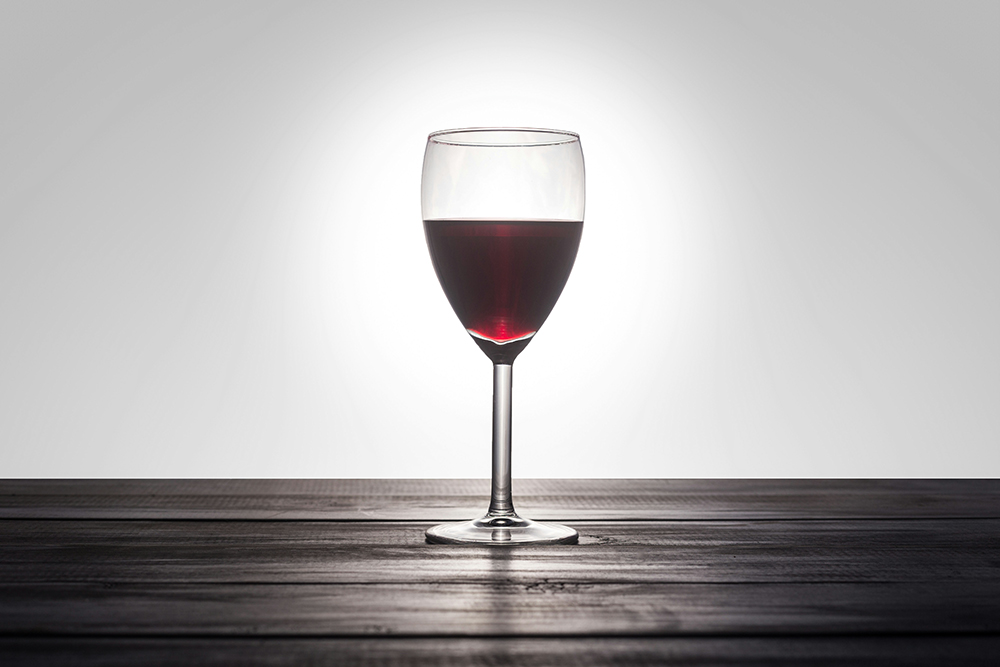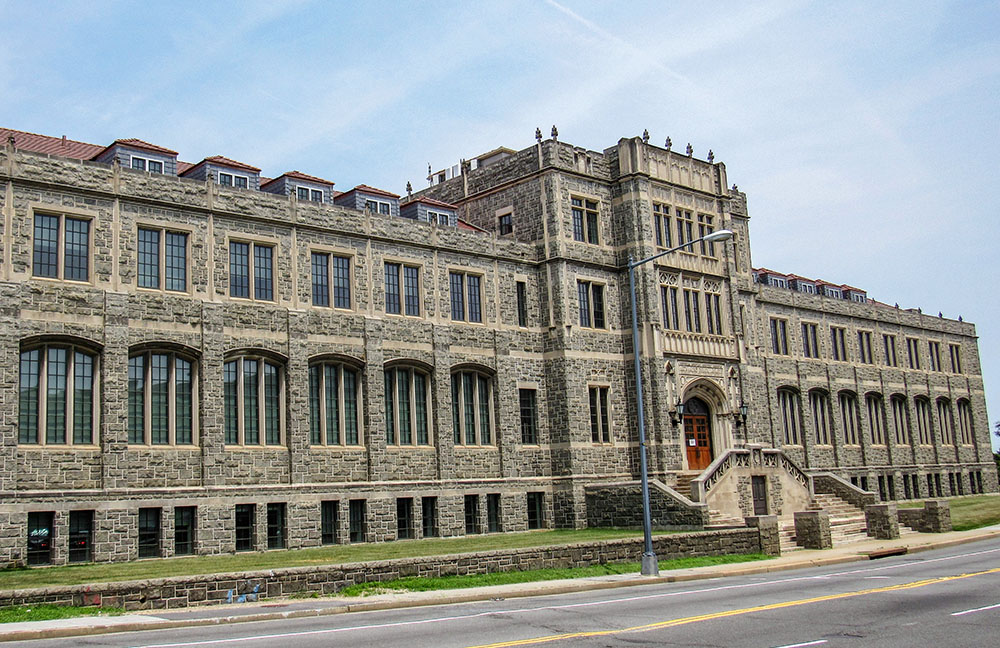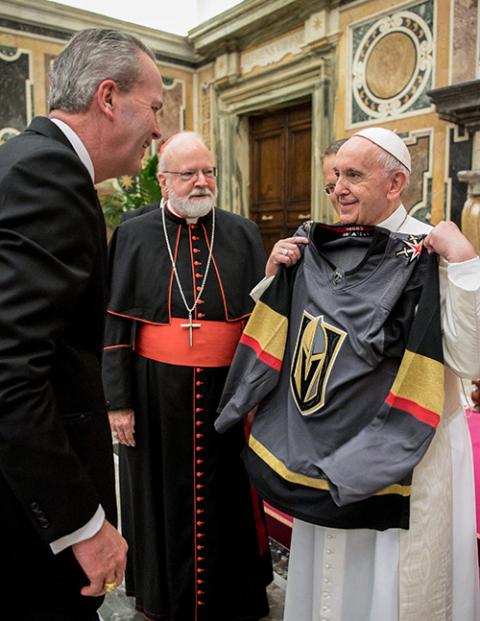
(Unsplash/Patrick Fore)
The story was deliciously intriguing, a tale of Tim Busch taking a conciliatory tone, wishing, he said during the most recent high-end gathering of his Napa Institute, for a healing of divisions in the U.S. Catholic world.
That was followed quickly by another version of Busch taking the conciliatory path and, with the help of Jesuit Fr. Jim Martin's contact list, bringing Catholics with differing views together over dinner and wine — lots of wine from the Busch family's Trinitas Cellars, a boutique winery.
What is going on?
The details might have one salivating. Dinners, according to the report in RNS, are hosted by Busch and his wife, Steph, in an apartment in Manhattan, New York, with a private chapel (where Mass is celebrated prior to dinner) and overlooking the Freedom Tower and the Statue of Liberty.
The "Mediterranean-inspired" meal is prepared by a French chef and accompanied by a Cabernet named Francis, after the pope, who, according to Busch, also receives donated cases.
At the Manhattan gatherings, people discuss their favorite Bible verses as well as their families and their lives. Conversation, apparently well-oiled at times — one report said the average is "one bottle per guest" — is quite conciliatory. Often there are tears. And, as Martin and Busch say, all go home happy.
Whatever the cost of the fancy dinners, it is a pittance compared to the amount of money Busch has invested in some of the most divisive politics this country has known.
I don't want to be the one to spill Napa red on the white tablecloth. Nor do I wish to impugn anyone's motives. Maybe Busch is as exhausted as the rest of us with the tensions and divisions in the Catholic universe. Perhaps he simply wants the satisfaction of knowing that people who disagree on important matters can still gather, in all civility, for a meal.
There exists, however, a very clear record — one that would have to be part of the consideration in any effort by Busch, as reportedly said in his Napa Institute speech, to leave the culture wars behind. For whatever the cost of the fancy dinners, it is a pittance compared to the amount of money Busch has invested in some of the most divisive politics this country has known and in promoting some of the most divisive figures, outlets and organizations in the contemporary Catholic world. He has gathered cultural and ecclesial leaders and influencers to advance an extreme libertarian economics ideology and a vision of church that is narrow, exclusive and often in conflict with the Francis papacy.
Busch is not shy about personal details in his bio on the website of the Busch School of Business at the Catholic University of America. He gets his name on the school in Washington, D.C., because of a $15 million donation he made along with a $10 million donation from the Charles Koch Foundation.
An attorney in Orange County, California, he is the founder of the Busch Firm, "which specializes in high net-worth estate planning, real estate and business transactions, tax and religious organization representation," the bio says. He is the founder and CEO of Pacific Hospitality Group, a firm that develops and manages high-end resorts and hotels.

Maloney Hall, which houses the Busch School of Business at the Catholic University of America in Washington, D.C. (Wikimedia Commons/Farragutful)
He inhabits a world unknown to most. In addition to his businesses and winery, he is part owner of the Stone Eagle Golf Club in Palm Desert, and a member of the Reserve Country Club in Indian Wells, the Newport Beach Country Club, the Pacific Club Newport Beach, and Balboa Bay Club, all in California. He and his wife have a primary residence in Laguna Hills and a second residence at Reserve Country Club in Indian Wells, both in California.
Wealth has allowed him also to found the Napa Institute, a far-right organization that holds events, most notably summer conferences at Busch's Meritage Resort and Spa in Napa. For a cool $2,900 (not including airfare or hotel costs) you can sign up for the 2025 event.
What has any of this to do with a glorious evening in New York?
Access and influence
Busch's wealth is important because it translates into access and the ability to influence. And that influence has been anything but conciliatory.
A telling moment occurred during a 2017 conference on "Good Profit" co-sponsored by the Napa Institute and the Busch School of Business, which in some regards are coterminous. "Good Profit" referred to the title of a book by Charles Koch, who also was the honored guest during the three-day gathering.
On the second day, inserted among a parade of speakers who argued for economics without "distortion," a term meaning with no government interference at all, was Cardinal Peter Turkson, then prefect of the Vatican Dicastery for Promoting Integral Human Development. His talk, grounded in a detailed if brief recitation of Catholic social teaching and history from the 1891 Rerum Novarum to the current era, was a resounding rebuttal to most of what had been preached by the libertarian crowd.
Advertisement
When Turkson finished, and just before introducing a discussion with Koch, Busch tried to bridge the gap. "We have to discern and reconcile," he said, without explaining what about church teaching had to be reconciled with what.
He added, even more curiously, "We have to listen to both sides."
The avowed traditionalist, who loves to conduct eucharistic processions around Manhattan and who clings to the most traditional understandings of church teachings on abortion and sexuality, would apparently see the church, in this instance, as merely presenting one side to be considered.
Busch went on to describe Koch as "a re-founder of America," and claimed that the gift he and Koch bestowed on Catholic University "made it great again."
He also said, in a rather breathtaking claim, that Catholic University "can be the teaching pulpit for the American church, but also the teaching pulpit for the Vatican and for the global church."
In another setting in 2017, the sanctuary of the Crypt Church at the National Shrine of the Immaculate Conception in Washington during a liturgy, Busch described the national moment as "this very, very important time of our nation ... a time when many of us as Catholics saw it as a time of darkness and now we see a time of light. It may be a challenging light, but a time of light," he said in an apparent reference to the transition in presidential administrations from Barack Obama to Donald Trump.

Pope Francis accepts a jersey from Tim Busch during an audience with members of the Papal Foundation at the Vatican May 10, 2019. Looking on is Boston Cardinal Sean O'Malley. (CNS/Vatican Media)
Busch was a public apologist for the since-excommunicated Archbishop Carlo Maria Viganò, who called for the pope's resignation. In a 2018 interview with The New York Times, Busch said, "Archbishop Viganò has done us a great service," referring to a letter in which the former Vatican diplomat accused Vatican officials of covering up the case of the disgraced Cardinal Theodore McCarrick.
Politics, religion and money
The Napa summer get-togethers have hosted the most extreme right figures in politics and church. The group's "episcopal adviser" and occasionally featured speaker is retired Philadelphia Archbishop Charles Chaput, an aggressive critic of Pope Francis, particularly of his emphasis on mercy and inclusion.
Among the speakers at these gatherings was Cardinal Raymond Burke, the archconservative who has repeatedly criticized Francis, defended Vigano and railed against "pervasive errors" in contemporary Catholic teaching.
Politics was on the bill of the Napa summer program in 2019 when Sen. Lindsey Graham spoke in support of then-President Trump, and again in 2023 when former Vice President Mike Pence touted the Trump administration's accomplishments at appointing conservative judges and justices.
Busch is frequently mentioned in league with other big-dollar Catholics such as hedge funder Sean Fieler and merchant banker Frank Hanna III, who share the same political and ecclesial ideology and back it up with hefty donations to right-wing organizations.
They all share association with Leonard Leo, whose long history as an official with the Federalist Society was central to developing the list of conservative judges appointed by Trump. Leo is on the board of another recent Busch venture, the Napa Legal Institute.
NCR has done considerable work over a number of years to document the influence of big money within the Catholic world and its power to elevate the most conservative voices in both church and society and to influence the most extreme right movements. It all constitutes a significant front in the culture wars. Busch is a major player in those circles.
Busch provides a window into the religion of certain one-percenters. It is a religion protective of wealth and an extreme capitalism, and limited in its fervor for Catholic tradition to a few pelvic issues.
Another event, instructive regarding Busch's religious and civic ambitions, was a three-day affair he hosted in 2017 at the then-Trump International Hotel in Washington.
It was billed as "an exclusive gathering of 'Catholic leaders, clergy and important DC insiders.' " There were, of course, elaborate dinners, one attended by Supreme Court Justice Samuel Alito.
Busch gave kudos to the Trump administration, saying, "What this administration represents is freedom." The closing dinner was given "in honor of the new administration."
Busch provides a window into the religion of certain one-percenters. It is a religion, if his economics gatherings are any indication, protective of wealth and an extreme capitalism, devoted to those in the political realm who agree, and limited in its fervor for Catholic tradition to a few pelvic issues.
What Busch intends to accomplish with his dinners is an open question. Fr. Martin, who has spent years advocating for the LGBTQ community inside the Catholic world, could surely provide him a master's class on how to deal with deep differences over the long haul.
Certainly, accept the invitation should it arrive. Join others at the table, break bread, and have great conversation. Just be aware that Busch is not a disinterested host, he is not a neutral arbiter of differences. He has promoted and benefited from many of the issues and personalities and organizations that create and exacerbate the divisions.
A wonderful meal. Fine wine. A glorious view of Lower Manhattan, the Statue of Liberty and New York Harbor. All of that is highly seductive. But if Busch wishes to leave the culture wars behind, there is a great deal more he could do beyond providing a magical night in the Big Apple.
Enjoy that gentle-as-a-dove time together. But be wise as well.








